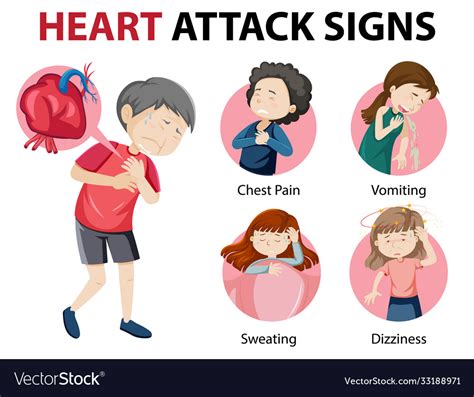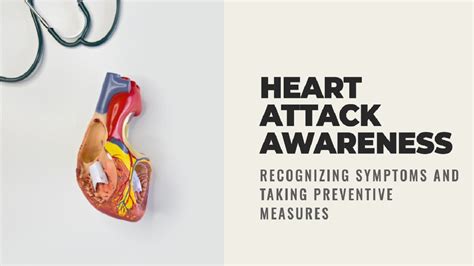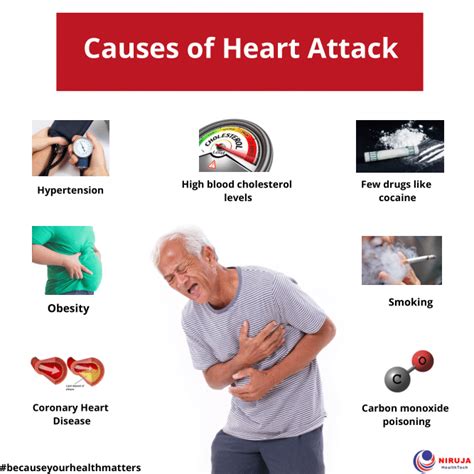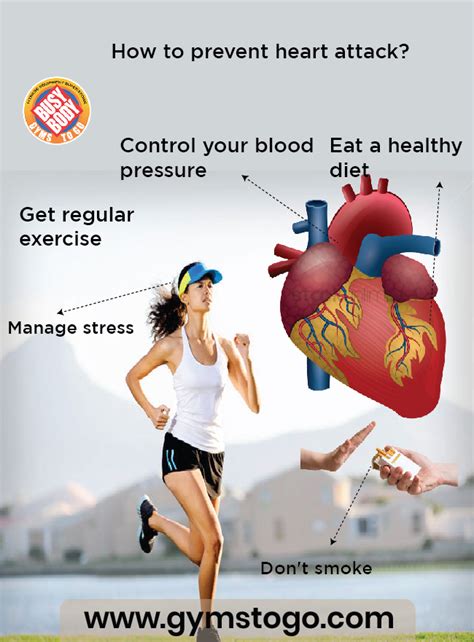Intro
Learn 7 heart attack symptoms, including chest pain, shortness of breath, and fatigue. Recognize warning signs like arm numbness, nausea, and dizziness to prevent cardiac arrest and ensure timely medical attention for cardiovascular health.
Recognizing the symptoms of a heart attack is crucial for prompt medical attention and treatment. A heart attack, also known as myocardial infarction, occurs when the blood flow to the heart is blocked, causing damage to the heart muscle. The sooner the symptoms are identified and medical help is sought, the better the chances of survival and minimizing damage to the heart. It is essential to be aware of the common symptoms of a heart attack to take immediate action.
Heart attacks can affect anyone, regardless of age or health status. While some people may experience severe symptoms, others may have mild or no symptoms at all. However, there are common signs that indicate a heart attack, and being familiar with them can save lives. The importance of recognizing these symptoms cannot be overstated, as timely medical intervention can significantly improve outcomes. In this article, we will delve into the symptoms of a heart attack, their causes, and what to do if you or someone you know is experiencing them.
The risk of heart disease and heart attacks has been increasing over the years, making it a leading cause of death worldwide. Factors such as lifestyle, genetics, and pre-existing medical conditions contribute to the risk of developing heart disease. Understanding the symptoms of a heart attack and taking preventive measures can help mitigate this risk. By being informed and proactive, individuals can reduce their risk of heart disease and improve their overall health.
Understanding Heart Attack Symptoms

Heart attack symptoms can vary from person to person, but there are common signs that indicate a heart attack. These symptoms can be mild or severe and may develop slowly or suddenly. Some people may experience a "silent" heart attack, where they do not exhibit any noticeable symptoms. However, in most cases, people experience some warning signs that should not be ignored. The most common symptoms of a heart attack include chest pain or discomfort, shortness of breath, pain or discomfort in the arms, back, neck, jaw, or stomach, and feeling weak, light-headed, or faint.
Chest Pain and Discomfort
Chest pain or discomfort is the most common symptom of a heart attack. This pain can feel like pressure, tightness, or a squeezing sensation in the chest that may radiate to other areas of the body. The pain can be constant or come and go, and it may worsen with activity or stress. In some cases, the pain may be mild or feel like indigestion or heartburn. However, if the pain is severe or persists for more than a few minutes, it is essential to seek medical attention immediately.Recognizing the Signs of a Heart Attack

In addition to chest pain, there are other signs that may indicate a heart attack. These include shortness of breath, which can occur with or without chest pain, and pain or discomfort in the arms, back, neck, jaw, or stomach. Some people may experience a feeling of weakness, light-headedness, or fainting, which can be a sign of a heart attack. Other symptoms may include nausea, vomiting, or a cold sweat.
Shortness of Breath
Shortness of breath is another common symptom of a heart attack. This can occur with or without chest pain and may be a sign that the heart is not pumping enough blood to meet the body's needs. Shortness of breath can be a symptom of a heart attack, even if there is no chest pain. If you experience shortness of breath that is severe or persistent, it is essential to seek medical attention immediately.Causes of Heart Attack Symptoms

Heart attack symptoms are caused by a reduction in blood flow to the heart, which can be due to a blockage in the coronary arteries. The coronary arteries supply blood to the heart muscle, and if they become blocked, the heart muscle can become damaged or die. The most common cause of a heart attack is a blood clot that forms in a coronary artery, which can be triggered by a variety of factors, including atherosclerosis, blood clots, and coronary artery spasms.
Atherosclerosis
Atherosclerosis is a condition in which the coronary arteries become narrowed and hardened due to the buildup of plaque. This can reduce blood flow to the heart and increase the risk of a heart attack. Atherosclerosis is a common cause of heart attacks and can be caused by a variety of factors, including high cholesterol, high blood pressure, and smoking.Preventing Heart Attack Symptoms

While some risk factors for heart disease cannot be changed, such as age and genetics, there are many steps that can be taken to reduce the risk of a heart attack. These include maintaining a healthy lifestyle, such as eating a healthy diet, exercising regularly, and not smoking. It is also essential to manage any underlying medical conditions, such as high blood pressure or diabetes, and to seek regular medical check-ups.
Healthy Lifestyle
Maintaining a healthy lifestyle is crucial for reducing the risk of a heart attack. This includes eating a healthy diet that is low in saturated fats, trans fats, and cholesterol, and high in fruits, vegetables, and whole grains. Regular exercise, such as walking or jogging, can also help to reduce the risk of a heart attack. Additionally, not smoking and limiting alcohol consumption can also help to reduce the risk of heart disease.Treatment for Heart Attack Symptoms

If you or someone you know is experiencing symptoms of a heart attack, it is essential to seek medical attention immediately. The treatment for a heart attack typically involves a combination of medications and medical procedures. Medications, such as aspirin, beta blockers, and clot-busting drugs, can help to reduce the severity of the heart attack and prevent further damage to the heart. Medical procedures, such as angioplasty and stenting, can help to restore blood flow to the heart and prevent further blockages.
Medications
Medications play a crucial role in the treatment of a heart attack. Aspirin, for example, can help to reduce the severity of the heart attack by preventing further clotting. Beta blockers can help to slow the heart rate and reduce the workload on the heart, while clot-busting drugs can help to dissolve the blood clot that is causing the heart attack.Conclusion and Next Steps

In conclusion, recognizing the symptoms of a heart attack is crucial for prompt medical attention and treatment. By being aware of the common symptoms of a heart attack, including chest pain, shortness of breath, and pain or discomfort in the arms, back, neck, jaw, or stomach, individuals can take immediate action and seek medical help. Maintaining a healthy lifestyle, managing underlying medical conditions, and seeking regular medical check-ups can also help to reduce the risk of a heart attack. If you or someone you know is experiencing symptoms of a heart attack, do not hesitate to seek medical attention immediately.
What are the most common symptoms of a heart attack?
+The most common symptoms of a heart attack include chest pain or discomfort, shortness of breath, pain or discomfort in the arms, back, neck, jaw, or stomach, and feeling weak, light-headed, or faint.
What causes a heart attack?
+A heart attack is caused by a reduction in blood flow to the heart, which can be due to a blockage in the coronary arteries. The most common cause of a heart attack is a blood clot that forms in a coronary artery.
How can I reduce my risk of a heart attack?
+You can reduce your risk of a heart attack by maintaining a healthy lifestyle, managing underlying medical conditions, and seeking regular medical check-ups. This includes eating a healthy diet, exercising regularly, not smoking, and limiting alcohol consumption.
We hope this article has provided you with a comprehensive understanding of heart attack symptoms, their causes, and how to prevent them. If you have any further questions or concerns, please do not hesitate to reach out to a medical professional. Remember, prompt medical attention is crucial in the event of a heart attack, so do not delay seeking help if you or someone you know is experiencing symptoms. Share this article with your loved ones to help spread awareness about the importance of recognizing heart attack symptoms and taking preventive measures. Together, we can work towards reducing the risk of heart disease and improving overall health and well-being.
